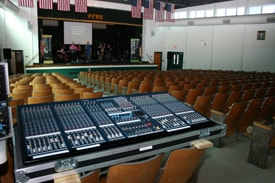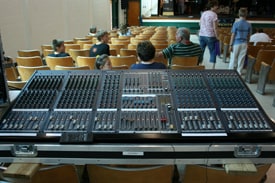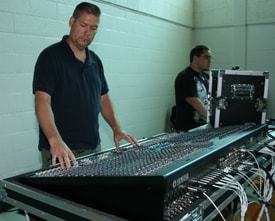Room to Grow: North Carolina Church Powers Its Sound With an IM8
 |
 |
 |
Like many new churches, the River Community Church in Fayetteville, North Carolina, lacks a permanent home for now. The 250 worshippers meet at a middle school auditorium every Sunday, setting up the sound gear for services and tearing it down each week.
Despite the less than ideal circumstances, they strive to provide professional quality audio for the congregation. Tim Ake, a professional firefighter with the city, mans the mixing console and decided to buy a Yamaha IM8-32.
“There’s a lot of good information on the Yamaha web site,” said Ake. “We looked at the MG series boards, but kept looking further. We looked at digital, too, but neither our budget nor our experience level can support a digital board.”
The church bought the console at Brooks Pro Sound, a local firm that services several area churches. “It’s a wonderful mixer,” said owner Marvin Brooks. “It’s clean. If you move a control on the console, like change the EQ, for instance, you can hear it. On lesser consoles, you turn the knob and don’t hear that much difference.”
Ake supervises a group of three volunteers. “We saw features like the aux sends, for instance, which set the IM8 above all the others and it’s got more capacity for down the road,” he said.
During services, the mixer is placed in the back row of the seating area, along with effects and recording equipment used to capture Pastor Todd Brady’s hour-long sermons and on occasion, the band, which likes to review their performance about once a month.
Recordings are done with a auxiliary microphones to a CD recorder, though Ake is hoping to experiment with more elaborate live recording setups once the congregation finds a permanent home. Having direct outputs on all the channels makes this easy. The church is also considering doing video recording.
The onstage musicians include two guitars, a bass guitar, an electric piano, a drum set and a half dozen singers. Pastor Brady uses a wireless microphone and Ake puts the audio feed through two powered speakers and two powered subs. He feeds amplifiers onstage to drive onstage monitors.
For now, the setup uses most of the IM8’s inputs, but Ake bought the console with future expansion in mind. The church’s former console, which had only 16 channels, was often inadequate and couldn’t accommodate situations when up to a dozen singers would gather onstage.
“We’ll have 12 singers one week and five singers the next week, so now we can leave a group of inputs assigned to a set of microphones, set the EQ and the monitors for them and leave the setup,” he said. “Then we don't have to reset the EQ or gain structure. It’s nice to have the extra channels we can dedicate to one singer or performer, especially when we’re tearing down every week. This way we can keep the settings the same from week to week.”
He appreciates the eight sub groups that the IM8 provides. He assigns all the singers their own group and, using the master mute feature, which shuts off all the inputs assigned to that bank, it really simplifies mixing, especially for the volunteers.
“After the singers are finished, we press one button and mute all the channels in the singers’ bank,” said Ake. “It’s an older school, so when people walk onstage you can hear each footstep. Since we mute the microphones until the performance actually begins, we eliminated that distraction.”
When Ake and his team considered different consoles, they appreciated the IM8’s aux sends, which gives them the flexibility to consider using in-ear monitors down the road. The mix matrices will allow them to send audio mixes into the vestibule and nursery area.
“We’re looking to move into a permanent home and we’d like to have sound in the sanctuary vestibule so that when people first arrive, they know what’s going on inside before they enter the sanctuary,” he said. “Also, if someone’s child is acting up and a parent has to leave the sanctuary, he or she can still hear what’s going on.”
He currently uses two aux sends for monitor mixes. Two monitors are assigned to the singers, who share one mix, and the other mix is for the band, a set up that replaces the former system’s single send that often overpowered the sound going out to the auditorium. Presently a third aux send is used for effects for the house and a fourth is dedicated to record the sermon or the band.
Though Ake has no formal training as a sound technician, per se, he learned how to operate an audio console at the age of 16 at his former church, learning through hands-on experience, reading magazines and trawling the Internet for pertinent information.
“I wouldn’t call myself an expert, but I am adept at using the equipment and understand how it operates,” he said. “We looked at everything that’s out there and the IM8 was head and shoulders above the other stuff available and we feel like we got the best bang for our buck.”
